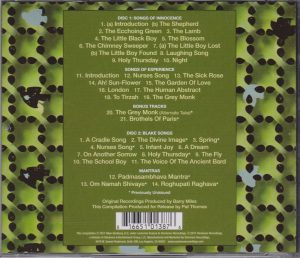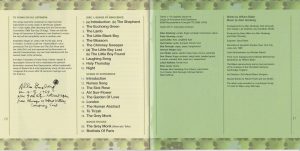In 2017, several years after his passing, Omnivore Recordings released a 2 CD set of Beat poet Allen Ginsberg’s unconventional performances of 32 of the poems and songs from William Blake’s “Songs of Innocence” and “Songs of Experience”.
In the late 1940s, Ginsberg had a life-changing epiphany in his Harlem apartment when he ‘heard’ the great English Romantic poet ‘reading’ some of these poems. Beginning in 1968, he began to write versions of many of the poems from the two works on a pump organ and harmonium, the latter which he played live in his readings from the 1960s onward.
On the first CD, he sings many of the songs with Peter Orlovsky, his long-time live-in poet-lover. The second CD has Ginsberg as the main vocalist, sometimes with a chorus, and also includes three Eastern mantras.
Musicians include the likes of Don Cherry, Elvin Jones, and many other musical guests. The main instruments are harmonium with guitar, flute (these first two instruments play the corresponding melodies sung for the most part), cello, and sometimes piano or organ. Other instrument backing includes trumpet, French horn, harpsichord, bass, drums, finger cymbals, and mandolin.
Beat figure Barry Miles produced the first session (June-July 1969) and the second July-August 1971). In the recordings, Ginsberg repeats some of the short poems, several last verses, and many final lines.
Generally speaking, the album contains two parts of one main journey through the Innocence and Experience poems; Ginsberg makes one pass through both poem sections in part 1/CD 1, then another through both again, covering poems he missed the first time. (It should be noted that several well-known poems like “The Tyger” and “The Clod and the Pebble” are not covered.)
Ginsberg’s trip through CD 1 starts, like Blake’s, with an emphasis on innocence, joy, a sense of (a shepherds’) God’s interest in and protection of children, resolution of whatever conflicts hinted at, a promise of heavenly rewards.
The Experience poems take over with a sense of the Fall, disappointments, cynicism, corrupt institutions like churches and governments, messed-up human relationships, repressive tyrants, and the miseries and sufferings of human beings.
CD 2 marks a return to Innocence, joy, freedom, empathy, sympathy, and the positive attributes of humans and God. Toward the end, though, a realistic view of life returns with sorrow, grief, poverty, “eternal winter”, “blasts of winter”, with a sense of death, imprisonment, and being lost in folly, doubt, and “an endless maze” in the journey through adulthood.
This album was a definite labor of love with an unconventional Beat poet setting Blake’s poems to unique music. It is a positive exercise which also allows Blake fans to revisit many of his poems and reconsider their possibilities of meaning and presentation. The ideas that are evoked by the performances open up new horizons for understanding and appreciating Blake’s work. Throughout, Ginsberg remains a happy, joyous, keen, sincere interpreter and medium throughout the sessions and this lends an overall charming quality to this project.




